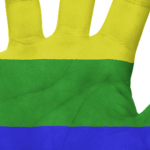The Historical Offence of Homosexuality in Australia

The history of homosexual law reform in Australia, and NSW in particular, is one of resistance against injustice and a recognition of the rights and dignity of LGBTIQ Australians.
The crime of buggery
Australia inherited its anti-homosexual laws from England.
In 1533, The Buggery Act entered into British law, punishing what was called “the detestable and abominable Vice of Buggery committed with Mankind or Beast“.
The offence criminalised anal sexual intercourse between men, as well as bestiality, seeing these acts as similarly immoral.
Criminal laws have tended to remain silent on lesbian sex, focusing instead on men who have sex with men. The penalties for gay sex under the early Australian criminal laws were severe, albeit rarely prosecuted.
Up until 1924, the punishment for gay sex in NSW was imprisonment for life (although later reduced to 14-year imprisonment).
In Victoria, gay sex carried the death penalty, a punishment harsher than British law at the time.
There has never been a criminal law against homosexuals as people in Australia, although Victoria’s stand-alone offence of “loitering for homosexual purposes” came close. Instead there was a preoccupation with anal sex between men.
The small number of prosecutions that did occur under Australian buggery laws were ambivalent as to whether anal sex was consensual, remaining preoccupied instead in the sexual corruption of youths.
Although not often taken to trial, the existence of criminal laws against buggery were often used to blackmail men as well as to provide pretext for police harassment.
Up until the early 20th century, gay sex was considered something all men could be tempted into with criminal laws acting as a deterrent to immoral lust.
Calls for reform
Increasing scientific and medical interest in “the homosexual” in the early 20th century along with the emergence of sexual liberation movements globally in the 1960s led to Australia’s earliest gay rights organisations.
The Campaign Against Moral Persecution, also known as C.A.M.P, was founded in Sydney in September 1970, becoming one of Australia’s earliest gay rights organisations.
The founding goals of C.A.M.P were centred on anti-discrimination protections for private sexual matters. As expressed in its newsletter, its aims were to:
[B]ring about a situation where homosexuals can enjoy good jobs and security in those jobs, equal treatment under the law, and the right to serve our country without fear of exposure and contempt.
Inspired by the post-Stonewall marches in San Francisco the very first gay rights march in Australia occurred in Sydney on the 24th of June 1978 – what would eventually become the annual Sydney Gay and Lesbian Mardi Gras. Police arrested fifty-three people during the march.
An increased presence of out and proud gay people led to a rise in gay hate crimes in the 1970s and 80s, these crimes were often poorly handled or ignored by police at least partially because gay sex remained a crime.
NSW gay rights activists achieved anti-discrimination protections for homosexuals in 1982, and successfully lobbied for the decriminalisation of consensual sex between males in 1984.
Most other jurisdictions reformed their criminal laws in the 1980s. However gay sex remained a crime in Tasmania until 1994 when the Federal Keating government passed the Human Rights (Sexual Conduct) Act 1994, which uniformly decriminalised consensual gay sex between adults throughout Australia.
Age of consent
Following the decriminalisation of gay sex, many jurisdictions retained a differing age of consent for homosexual sex compared to heterosexual sex.
In NSW following decriminalisation, the age of consent for homosexual sex was set at 18 years old whilst the age of consent for heterosexual sex was 16 years old.
This frustrated gay activists as it didn’t achieved equality under the law. The decision to maintain a higher age of consent also appeared to echo homophobic fears that gay men were “corrupting youth”.
Only South Australia, Victoria and (much later) Tasmania set an equal age of consent during decriminalisation.
The Northern Territory, the ACT and Queensland echoed the NSW approach, setting the age of consent to gay sex at 18. In Western Australia, the age of consent for gay sex was 21 years old.
It was a slow process equalising laws regarding age of consent.
Some were early reformers, for example the ACT equalised consent in 1985. However, most jurisdictions were slow to change mostly due to moral panic regarding teenage sex.
It wasn’t until 2003 that the age of consent was formally equalised in NSW. Equalisation occurred in Western Australian in 2002 and the Northern Territory in 2004 with Queensland remaining the last jurisdiction to equalise the age of consent in 2016.
Recognising past wrongs
Recently Australian governments have been called upon to recognise past wrongs and expunge convictions under anti-homosexual laws.
In 2014, the Criminal Records Act 1991 (NSW) was amended to allow historical homosexual offences to be extinguished in NSW.
Under the changes made to the Act, the Secretary has the authority to decide that an eligible conviction should be extinguished but only if he or she is satisfied that the other person involved in the sexual activity consented to the sexual activity and was above the age of consent.
Applications can be via the NSW Department of Justice website.
Expungement schemes for homosexual offences now exist in all States and Territories in Australia.
In a relatively short period of time Australia’s criminal law has shown a dramatic shift in perceptions regarding gays and lesbians.
No longer framed as immoral tempters of young men to be deterred, our laws now reflect that sexual diversity is something to be celebrated not criminalised.






